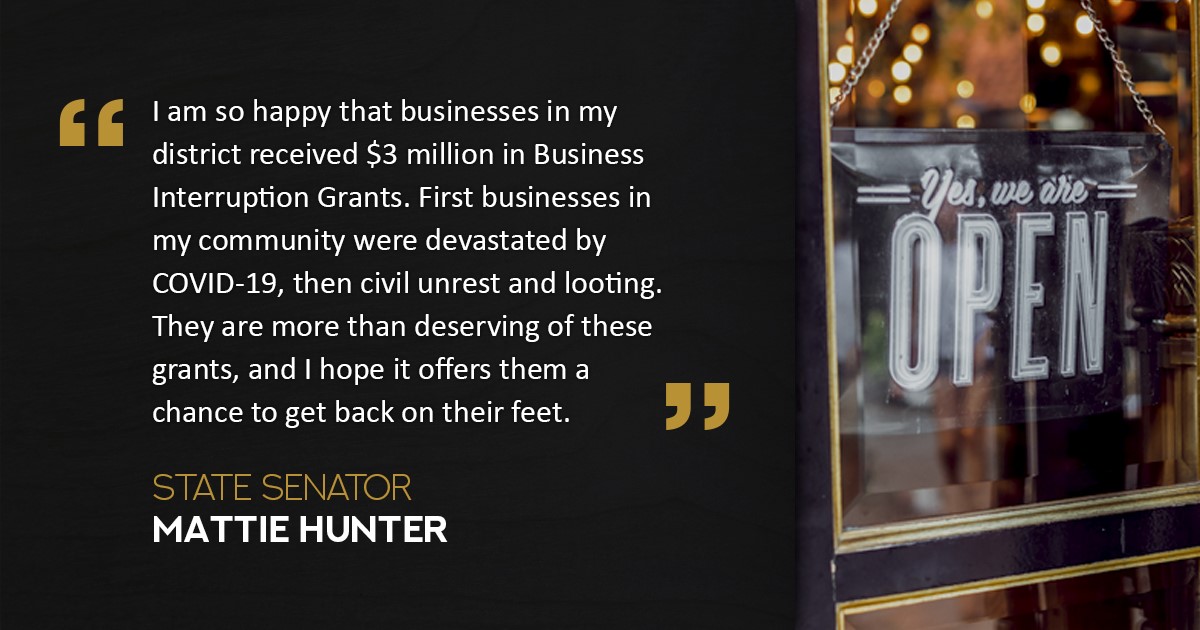Hunter celebrates BIG grants in her district
- Details
- Category: News

CHICAGO – In an effort to provide support to small business owners facing economic hardship as a result of the COVID-19 crisis, State Senator Mattie Hunter (D-Chicago) announced more than $3 million in Business Interruption Grants for hundreds of businesses in her district.
“I am pleased businesses in my district received $3 million in Business Interruption Grants,” Hunter said. “First, businesses in my community were devastated by COVID-19, followed by civil unrest and looting. My heart goes out to them for all the hardships they’ve faced these past several months. People put their whole lives into their businesses, and deserve to see their hard work pay off.”
Hunter reprimands looters, calls for one Chicago instead of two
- Details
- Category: News
 CHICAGO – In light of the recent civil unrest on Chicago’s Magnificent Mile ignited by conflicting reports on a shooting in Englewood, State Senator Mattie Hunter (D-Chicago) called for more transparency and togetherness in her community at a press conference Wednesday.
CHICAGO – In light of the recent civil unrest on Chicago’s Magnificent Mile ignited by conflicting reports on a shooting in Englewood, State Senator Mattie Hunter (D-Chicago) called for more transparency and togetherness in her community at a press conference Wednesday.
“My heart is aching for my community, as the Southside, Westside and downtown areas have been struggling with looting and effects of the pandemic since May,” Hunter said. “The saddest part is – many of the looters are not even from our neighborhoods. They come from out of town, they take what they want, and the underprivileged communities get the blame.“
Hunter urges residents to apply for housing assistance
- Details
- Category: Constituent Services
CHICAGO – Illinoisans across the state have faced financial struggles during the COVID-19 pandemic — but those on Chicago’s South Side have been disproportionately affected. Senator Mattie Hunter (D-Chicago) is urging those residents to apply for the Emergency Rental Assistance (ERA) Program.
“People desperately need help with rent,” Hunter said. “Though residents can’t get evicted right now, they will still need to pay their rent at some point. It’s my hope the program will help those who have been unemployed or not receiving income due to COVID-19 to catch up on their bills.”
Earlier this week, Governor JB Pritzker and the Illinois Housing Development Authority (IHDA) announced $150 million in available funds to help residents across the state during this national emergency by introducing the largest housing assistance program in the nation.
Tenants whose applications are approved will receive one-time grants of up to $5,000 paid directly to their landlords to cover missed rent payments beginning March 2020 and prepay payments through December 2020, or until the $5,000 is exhausted, whichever comes first.
Tenants are eligible if:
- Their household income before March 1, 2020 was at or below 80% of the Area Median Income,
- An adult member of the household had a loss of income due to the COVID-19 crisis on or after March 1, 2020; or
- A household has an unpaid rent balance that began on or after March 1, 2020.
“Helping people most in need is what the government is supposed to do,” Hunter said. “I’m proud our state is able to do something impactful during this time.”
Residents who are eligible may apply online at era.idha.org. Applications for ERA will be accepted now through Aug. 21.
Please note, applicants should apply as soon as possible, as the application window may close early due to high volume.

The public health investment the Tribune Editorial Board chooses to ignore
- Details
- Category: News
(The following op-ed from Senator Mattie Hunter was submitted to the Chicago Tribune on July 28, 2020)

For the Chicago Tribune Editorial Board to say our federal aid request had “little to do with public health” is disingenuous at best and a flat out lie at worst.
That request specifically asked for the single largest public health investment in Illinois minority communities in modern history.
It is an overdue investment.
It comes at a time when people in Black and Brown communities are being infected, hospitalized and dying at rates exceeding any other community.
It comes as a time when there is growing recognition of these communities’ economic, social and human needs being ignored decade after decade.
That’s why we sought $1 billion in public health investment targeted to these underserved, disproportionately impacted neighborhoods. We also requested hardship pay for the heroes working on the front lines against this virus in health care facilities.
The Tribune Editorial Board skipped all that.
Those are especially hard items to overlook given they were included in Tribune news coverage. Perhaps the Editorial Board should read the paper.
The Tribune Editorial Board’s views on federal relief are stunningly tone deaf at a time when millions of Illinoisans are facing unemployment, food insecurity and lingering racial divisions. I could point out the numerous errors in their argument and judgement, but that’s another letter for another time.
The Editorial Board may score political points in some circles with its finger wagging refrain. I hope it satisfies them. The rest of us will remain focused on getting Illinois through this crisis.
More Articles …
Page 80 of 143


